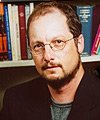I’ll begin by (again!) agreeing with Jeff: It’s good for democracy when a group of citizens become politically engaged. Debates are more robust, candidates have sharper visions, and civic participation rises. All of us agree that evangelicals now have power. But their legacy is still up for grabs. What does the future hold?
Power is still relatively new to evangelicals, and as people of the Book, they are in a tough spot when they want guidance.
Throughout most of the Bible, the faithful are not very powerful. But dozens of people I interviewed mentioned one passage that they found instructive. It’s taken from Jeremiah 29. Here the prophet tells the Jews how they ought to view their time in Babylon, where they had been taken into captivity by Nebuchadnezzar: “Seek the peace and the prosperity of the city to which [you have been carried]…because if it prospers, you too will prosper.”
The powerful people I interviewed identify with the feeling of being in exile, which sounds strange. “How are you in exile?” I would ask. “Aren’t you sitting in the corner office? Didn’t your side win in the last election?” But many of these leaders grew up signing a hymn that says, “This world is not our home.” The sense of being a sojourner, even when running a Fortune 500 company, is embedded in their religious DNA.
This isn’t a refusal to acknowledge the power they have; it’s a skeptical attitude toward it. This vision of power held at arm’s length is what makes evangelicals different from the rest of the American elite. Otherwise, they will become just another privileged group, what Hanna aptly described as something akin to “the Politburo circa 1989.” Some evangelicals already act that way, but they don’t represent evangelicalism as a whole or its future.
Tim Keller pastors Redeemer Presbyterian Church in Manhattan, and he is the most popular preacher among the nation’s cosmopolitan evangelicals. Keller has urged fellow evangelicals to view themselves as part of a “counterculture” that resists the charms of the establishment. But he also urges them not to work for their sectarian interests, but rather for the “common good.”
If evangelicals end up merely using politics for sectarian aims, we will all be worse off. Their Gospel will be less attractive to non-Christians. Other religious groups will feel increasingly marginalized. Faith will be seen as another tool for manipulating the public. So history will have to be the judge of whether this has been merely the triumph of another interest group or if the evangelical ascendancy has contributed to a more enlightened democracy, where engaged citizens use their faith to serve the common good.

